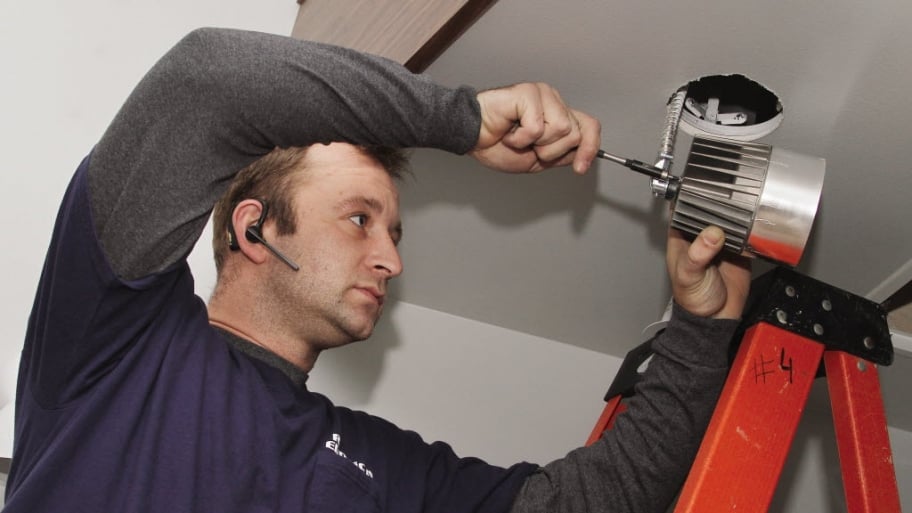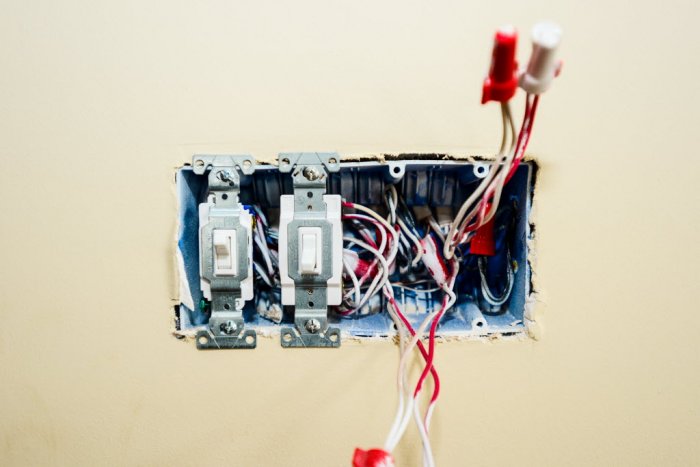Electricians

Most homeowners call electricians in an emergency or if they’re building or remodeling. It’s important to research a contractor and find a skilled electrician before you need one. By building a rapport with an electrician, you can be sure that they will be there to help when you need their services. So, you’ll want to hire an electrician for regular inspections before an emergency takes place. A good electrical contractor will become familiar with your home’s systems and possibly discover emerging problems before they become major situations.
Hiring an electrician is an important decision because they work with critical home systems that affect nearly every aspect of the building and can cause significant inconvenience, damage or even house fires if the work goes wrong.
As always, homeowners should get multiple bids to ensure they received the best price for the service. To vet the companies, homeowners should ask about the following items:
Up-to-date education: A reputable company will require staff to attend regular training courses and stay current on the National Electrical Code, which is amended every three years.
Pulling permits: A permit is usually required in most counties and from the power company any time you’re replacing a home’s main electrical equipment or doing a significant amount of rewiring. The cost of the permit is often included in your electrician’s bill, but be sure to ask. With the permit comes an inspection to ensure the work meets code.
Legitimate licensing: If your state requires electricians to be licensed, check that the license is current. Poor wire connections, overloaded circuits, improper grounding and broken safety elements on an electrical panel are just a few of the problems that can arise from bad workmanship. To check an electrician’s licensing, refer to the Angie’s List License Check tool. You should also protect yourself by verifying the hold the appropriate bonding and insurance, including general liability and workers’ compensation coverage.
Specialization: Since companies specialize in different areas and scopes of work, it’s important for homeowners to hire the right company. If a homeowner only wants to replace outlets and switches, then he or she probably shouldn’t waste time calling commercial electricians that wire large buildings.
Find out who’s doing the work: You’ll want to know if the electrician does the job themselves, if they employ helpers or apprentices, or if they use subcontractors. In the case of helpers and apprentices, verify that a licensed electrician will supervise them, and in the case of subcontractors, make certain their insurance covers you as well.
Ask about their warranty: Highly rated electricians say a good contractor will offer a parts and labor warranty to show that they stand behind their work.
Most electricians learn on the job through an apprenticeship program of several years, which tends to vary by state. Most state licenses require a certain number of hours of on-the-job training. The path of how to become an electrician depends on several factors, including whether the company is union or non-union, state regulations and the demand for more electricians in that region.
The path on how to become electrician usually starts either with an apprenticeship or a term as an electrician’s helper. Electricians in training observe their mentors at work, take on some of the task, learn the roles of electrician’s tools and take on greater and greater responsibility as they progress. Their salary also increases by year until they’re reader to take the test to acquire their electrical license. They can also undergo specialized education at a technical school or a union training facility, which usually involves matching the trainee with an appropriate electrical contractor.

Familiarizing yourself with home electrical equipment and common problems may help prevent future issues. (Photo by Summer Galyan)
Electrical projects
Unless you know what you’re doing exceptionally well, carefully consider the prospects if you’re planning on do-it-yourself electrical work. You can easily get in over your head, causing costly damage, creating potentially dangerous hazards and run afoul of local or state electrical code and regulations. In general, electricians say you can handle installing receptacles, outlets and lighting fixtures as a DIY job if you have a clear idea what you’re doing, but more complex work requires expert help.
Electrical work covers a wide variety of tasks, ranging from major jobs like home rewiring or breaker box replacement to minor work like installing fans or upgrading electrical outlets with USB ports.
Though the basics of electrical work have not significantly changed in the last few decades, electrical contractors and homeowners alike face new challenges as advancing technology creates heavier demand on electrical loads and presents new opportunities for major upgrades such as home automation.
Electricians can also conduct home electrical system inspections that will identify problem areas, future trouble spots and areas of immediate concern. Such an inspection can take place before you buy a home or any time afterwards to check your status.
Your home may be giving you several clues that you need immediate help from a professional electrician. If you feel mild shocks or tingles from appliances, you may have a ground fault issue that requires attention (although shocks after crossing a carpeted surface aren’t cause for concern.) If your ceiling fixtures are warm or lights are flickering, that may be a sign of loose wiring. Light switches or receptacles that turn on and off at random could be signalling a problem with loose wiring or internal damage. If any outlet emits a burning odor or sparks, shut down the electrical panel right away and call an electrician for help, as you could be at immediate risk for fire.
Many homes built before 1950 contain old-fashioned knob and tube wiring, which is widely believed to pose a hidden risk to homeowners. It was the primary wiring method from the 1880s through the 1930s, and still used into the 1970s for some new home constuction. This form of older wiring creates a risk of faults and fires, and often can’t handle the electrical load of modern houses. How much does replacing knob and tube wiring cost? You can expect to pay between $8,000 and $15,000 for an average-sized home.
Electricians can also install whole house surge protectors for between $300 and $1,000. Whole house surge protection blocks incoming surges at the breaker box and can protect your electronics and appliances from damaging electrical surges if you live in an area prone to lightning strikes.
Older and outdated breaker boxes often present problems such as fire hazards or overloaded circuits. Licensed electricians say a breaker box replacement will range from $500 to $3,000 depending on the sie of the house and the type of box.
Electricians can also install and upgrade outlets for safety purposes. An arc fault circuit interruptor (AFCI) outletcuts off power in the breaker box as soon as it detects a sharp spike or drop in voltage. This prevents dangerous sparks or excessive heat, which is a common cause of residential electrical fires. AFCI upgrades cost about $40 per breaker plus labor, so electricians estimate this work should cost between a few hundred and a few thousand dollars, depending on the scope of the replacement. A ground fault circuit interruptor (GFCI) outlet detects disturbances in current and shuts off electrical flow quickly. This protects against electrical shock by breaking the circuit immediatley, faster than circuit breakers or fuses. They are typcially installed in areas that come in contact with water, like kitchens or bathrooms, but can be installed anywhere. Although they primarily protect against electrocution, they also provide further protection against fires and damage to appliances. A GFCI outlet can normally be identified by the “reset” and “test” buttons on their face.

Trained electricians know the significance of electrical wire color codes. (Photo by Summer Galyan)
Types of electricians
Although the study of electrical phenomena goes back to ancient times, it was not until Thomas Edison’s era that electrical currents could be sufficiently controlled to be used in homes.
Edison wasn’t the first inventor to build a light bulb, but he developed the first electric-powered bulb that would actually stay lit and not burn itself out after a few minutes of use. He patented his invention in 1880 and soon afterward founded Edison General Electric.
Many other electric companies quickly sprang up across the U.S. and in Europe as the race was on to generate electricity and disseminate it to businesses and homes. Natural gas light fixtures and kerosene lamps were phased out as the electric networks grew.
This rapid growth also created a demand for a new profession — the electrician. Even today, the job of electrician can be dangerous and even deadly. In the early years there were not yet many safety features, so electrocution and fires were not uncommon. However, today’s electricians , electrical engineers and linemen are extensively trained to provide the safest possible service.
Electricians are trained to recognize a variety of important elements, including staying familiar with the most up-to-date version of the National Electric Code and knowing what the electrical wire color codes mean. Modern-day electricians need continuing training and education. They fall into different classifications:
Residential electricians install, maintain and upgrade electrical equipment in apartments and houses. They may also install outdoor landscape lighting. Their scope of work covers everything from outlet improvements to breaker box upgrades and total home rewirings. They also work on construction jobs to install wiring and boxes in new homes. Many states also have a special subset of electrical contractor license to cover installing home security systems and alarm work.
Commercial electricians work on construction sites, in commercial buildings and on mechanical electrical systems. Most commercial electricians perform some installation work, which may involve water heaters, commercial security systems and electronic key systems.
Journeymen electricians work with mechanical connections, lighting installation, power supplies, security systems and communications in both residences and commercial buildings. Journeymen electricians have completed several years of on-the-job training and acquired the appropriate license in their state. They are qualified to work in a wide variety of electrican contracting tasks and can usually oversee apprentices or helpers. A journeyman electrician may also work on overhead lines.
Master electricians are highly skilled electricians who generally work in a supervisory role or own contracting businesses. Many states require seven years of experience as an electrician or a bachelor’s degree in electrical engineering for certification as a master electrician. Licensing specifics vary by state, but in numerous cases, a business with numerous journeyman electricians must have a master electrician who oversees the entire operation.
